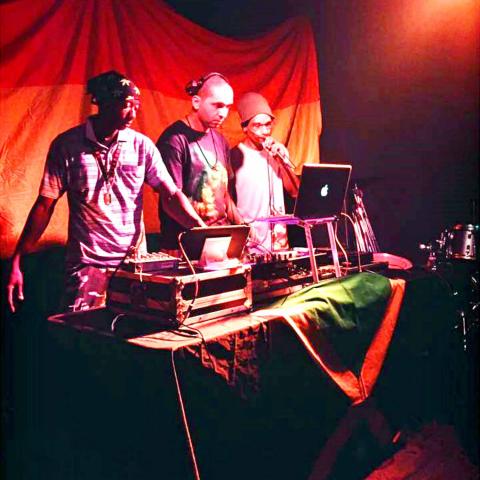Reggae wasn’t all the rage a couple years ago when Lion (Oliver Harley) and Taili (Thierry Cuvillier) of O-Brothaz Sound System started hosting reggae parties around the country. Perhaps it was the Caribbean cocktails or more exposure to the music (Lion and Taili like to think it was the latter) that made party-goers eventually come around and appreciate this soulful genre that was born on the streets of Jamaica.
The next Reggae Downtown will take place tonight at Triangle. Lion says to expect a steady flow of rum-infused Caribbean cocktails to accompany a concoction of roots and dancehall beats.
Don’t expect a rave though. The musical genre is about keeping it down to earth.

Photo courtesy of Islandjam
“Reggae has a healing and unifying quality about it,” Lion tells the Taipei Times. “A movement toward one people, one love and unity is the message of reggae.”
Roots reggae, after all, expresses the struggles of the urban poor. Its lyrics address social issues and are sometimes accompanied by some dabbling in spirituality. Dancehall, a slightly sexier subgenre, which developed in the dance halls of Jamaica in the 1970s, boasts faster beats, though it’s still about creating music that’s accessible and relatable to the general public.
“This is a faster music with DJs chanting or delivering lyrics or song over a riddim,” says Lion, using the Jamaican pronunciation for rhythm. “What we call the DJ is the singer or the vocalist, not the man playing the music — he is a selector.”
Lion adds that the best thing about reggae is that there are so many subgenres that there is bound to be something for everyone.
“Sometimes it is chill, sometimes it wants to be crazy, sometimes it wants to tell you about its pain or happiness.”
That being said, those interested in attending tonight’s event can probably expect a broad range of beats — a simple but surefire recipe for good vibes and good times.

May 26 to June 1 When the Qing Dynasty first took control over many parts of Taiwan in 1684, it roughly continued the Kingdom of Tungning’s administrative borders (see below), setting up one prefecture and three counties. The actual area of control covered today’s Chiayi, Tainan and Kaohsiung. The administrative center was in Taiwan Prefecture, in today’s Tainan. But as Han settlement expanded and due to rebellions and other international incidents, the administrative units became more complex. By the time Taiwan became a province of the Qing in 1887, there were three prefectures, eleven counties, three subprefectures and one directly-administered prefecture, with

It’s an enormous dome of colorful glass, something between the Sistine Chapel and a Marc Chagall fresco. And yet, it’s just a subway station. Formosa Boulevard is the heart of Kaohsiung’s mass transit system. In metro terms, it’s modest: the only transfer station in a network with just two lines. But it’s a landmark nonetheless: a civic space that serves as much more than a point of transit. On a hot Sunday, the corridors and vast halls are filled with a market selling everything from second-hand clothes to toys and house decorations. It’s just one of the many events the station hosts,

Among Thailand’s Chinese Nationalist Party (KMT) villages, a certain rivalry exists between Arunothai, the largest of these villages, and Mae Salong, which is currently the most prosperous. Historically, the rivalry stems from a split in KMT military factions in the early 1960s, which divided command and opium territories after Chiang Kai-shek (蔣介石) cut off open support in 1961 due to international pressure (see part two, “The KMT opium lords of the Golden Triangle,” on May 20). But today this rivalry manifests as a different kind of split, with Arunothai leading a pro-China faction and Mae Salong staunchly aligned to Taiwan.

Two moves show Taichung Mayor Lu Shiow-yen (盧秀燕) is gunning for Chinese Nationalist Party (KMT) party chair and the 2028 presidential election. Technically, these are not yet “officially” official, but by the rules of Taiwan politics, she is now on the dance floor. Earlier this month Lu confirmed in an interview in Japan’s Nikkei that she was considering running for KMT chair. This is not new news, but according to reports from her camp she previously was still considering the case for and against running. By choosing a respected, international news outlet, she declared it to the world. While the outside world